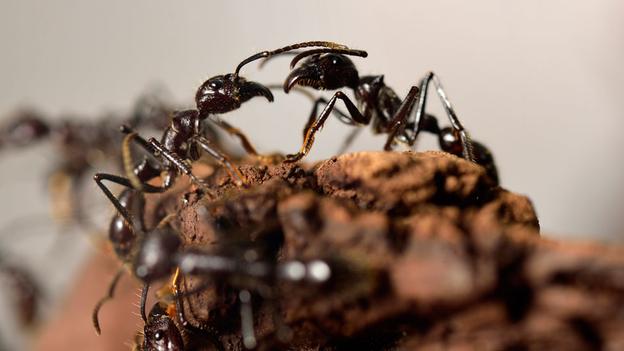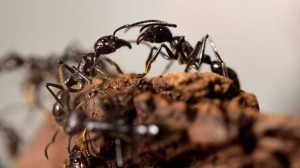Weekly Science Picks


Giant ants (Paraponera Clavata), appearing at the exhibition “Mille milliards de fourmis” at the Palais de la Decouverte in Paris. (Copyright: Getty Images)
Welcome to this edition of Weekly Science Picks!
Here’s a great little story to get us started about how one scientist found out about his Nobel Prize win this past week. He doesn’t carry a mobile.
Prof Peter Higgs did not know he had won Nobel Prize by BBC News
Nobel Prize-winning scientist Prof Peter Higgs has revealed he did not know he had won the award until a woman congratulated him in the street.
It’s now the 11th day of the US Government Shutdown. This past week I attempted to go to the Census Bureau website for research on population demographics near a development project I’m working on. No dice. This next story shows the impact that government funding has on science. The implications could be huge.
Fears for science amid US shutdown by David Shukman
Imran Khan, chief executive of the British Science Association, said: “The biggest lesson we should take from this week’s Nobel Prizes is that science doesn’t belong to one nation; it’s an international and collaborative human enterprise.
One could spend hours, even days pondering the origins of our solar system. Some devote their life’s work to it. Check out this story about comets and presolar grains.
First Evidence Found of a Comet Strike on Earth by Andrew Fazekas
“Because there is no sign of an impact crater, it has been a mystery as to what kind of celestial event actually could have caused this debris field, but a small, black stone found lying in the middle of the glass area caught our attention,” said study co-author David Block, an astronomer at Wits University in Johannesburg, South Africa.
Balancing the needs of economic development with conservation principles is not easy. Governments do have hard choices to make. Sustainable management of resources, both natural and economic, is not a choice; it should be a top policy priority.
In Indonesia, Environmentalists See a Disaster in the Making by Sara Schonhar
Now conservationists say the rapid clearing of virgin forest is paving the way for environmental catastrophe, turning critically endangered orangutans, tigers and elephants into refugees, and triggering landslides and flash floods.
These next two links speak for themselves. You know that line, “a picture is worth a thousand words”. The power of communication, through both photos and words, assists scientists in developing and proving theories and solving problems of the modern world. Enjoy your weekend. Maybe grab a camera, or your smartphone, and capture some scientific snapshots of your own.
Awesome Photos of NASA Equipment Tests by Vincze Miklos
The best science and technology pictures of the week by BBC Future
Burnes K (2013-10-13 09:13:10). Weekly Science Picks. Australian Science. Retrieved: Jul 27, 2024, from https://ozscience.com/news/weekly-science-picks-50/
 Follow
Follow